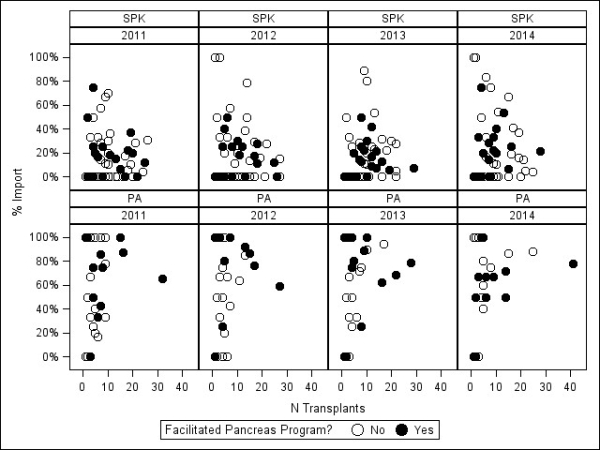Is Facilitated Pancreas Allocation Effective?
1UNOS, Richmond, VA
2Indiana Univ School of Medicine, Indianapolis, IN
3Univ of Wisconsin Hospital and Clinics, Madison, WI
4Univ of Maryland Medical System, Baltimore, MD.
Meeting: 2016 American Transplant Congress
Abstract number: 297
Keywords: Allocation, Kidney/pancreas transplantation, Pancreas transplantation, Public policy
Session Information
Session Name: Concurrent Session: Clinical Pancreas Transplantation 1
Session Type: Concurrent Session
Date: Monday, June 13, 2016
Session Time: 4:30pm-6:00pm
 Presentation Time: 4:30pm-4:42pm
Presentation Time: 4:30pm-4:42pm
Location: Room 309
Background: OPTN policy exists that allows the UNOS Organ Center to facilitate the allocation of a pancreas within 1 hr. of donor surgery, permissible only to those programs that have a written agreement to receive these offers. The OPTN pancreas transplantation committee has studied the utilization of this allocation schema.
Methods: OPTN potential transplant recipient (PTR) data were studied from 2008 through 2014 to find allocations where facilitated pancreas allocation (FPA) was used. The volume of transplants performed using FPA by center and year were studied to determine the rate each participating center imported pancreas for transplant. The volume of any type of pancreas transplant along with the percent imported was reported for each center, and was assessed to determine suitability regarding a more structured facilitated system.
Results: FPA resulted in 43 transplants in 2008, 38 in 2009, 10 in 2012 and 2013, and only 7 in 2014. Of the 31 centers on the list, only 11 accepted and transplanted a pancreas from a facilitated offer from 2012 through 2013. Pancreas transplant alone (PA) are performed with imported organs at a higher rate than simultaneous pancreas-kidney (SPK). Multiple programs that volunteered for FPA have not imported pancreas transplants, and some perform very few pancreas transplants at all. Multiple large volume pancreas programs do not import large volumes of transplants. On average, OPOs make the first offer of a pancreas 19 hours before cross clamp.
 N PA and SPK transplants by center and year 2011-2014, shown by participation in FPA and % of transplants imported.
N PA and SPK transplants by center and year 2011-2014, shown by participation in FPA and % of transplants imported.
Conclusions: The current system of FPA is ineffective due to the short notification time (1 hr before recovery) and a lack of participation and/or willingness to import pancreata by more than half of the programs that volunteered to be on the list. Developing qualifying criteria for centers to automatically receive FPA offers and allowing for a longer time window prior to recovery may increase the volume of pancreas transplants in the United States.
CITATION INFORMATION: Carrico R, Fridell J, Odorico J, Niederhaus S. Is Facilitated Pancreas Allocation Effective? Am J Transplant. 2016;16 (suppl 3).
To cite this abstract in AMA style:
Carrico R, Fridell J, Odorico J, Niederhaus S. Is Facilitated Pancreas Allocation Effective? [abstract]. Am J Transplant. 2016; 16 (suppl 3). https://atcmeetingabstracts.com/abstract/is-facilitated-pancreas-allocation-effective/. Accessed February 27, 2026.« Back to 2016 American Transplant Congress
